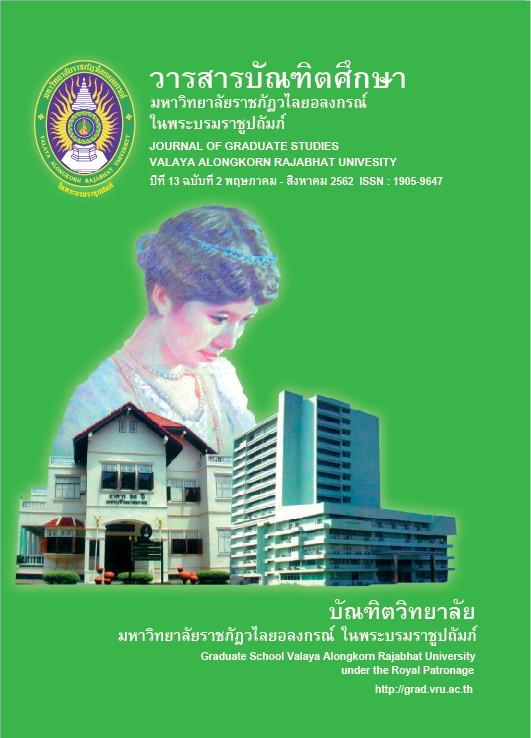A STUDY OF THE CONDITIONS AND PROBLEMS IN EVALUATING AND CREATING SCORING RUBRICS FOR EVALUATING THE 12 CORE VALUES AT THE SECONDARY LEVEL
Main Article Content
Abstract
The purpose of this research were 1) to study the conditions and problems in evaluating and creating scoring rubrics for evaluating the 12 core values at the secondary level; and 2) to study the conditions and problems of creating scoring rubrics for evaluating the 12 core values at the secondary level. The population used in the research was 3,606 teachers of basic education level under the Office of the Basic Education Commission for Secondary Education in Pathumthani, Prachinburi, and Sa Kaeo. The 348 people of the sample group was collected by using the Stratified Random Sampling. The instrument used in this research was a questionnaire that inquired about the conditions and problems of evaluating the 12 core values and creating scoring rubrics for evaluating the 12 core values at the secondary level. The data was analyzed by using frequency, percentage and content analysis.
The result of the research showed that the school recognizes the importance of cultivating good consciousness for the students. They tried to educate the 12 core values for the students to learn and they have assigned the relevant groups to organize activities and evaluate. Anyway, the teacher still lacks the knowledge and understanding of the measurement and evaluation that is appropriate and consistent with the measurement and evaluation of the 12 core values. Moreover, it was found that the problem in evaluating the 12 core values in the secondary level is that teachers do not understand the meaning of values deeply because they do not receive guidance. They are unable to organize teaching activities and activities that enhance the 12 core values and the evaluation after doing activities thoroughly and perfectly. The teachers want the schools or the related agencies to help in various ways, so that the teachers can measure and evaluate the 12 core values clearly and accurately than they should be. It also showed that the conditions and problems in creating scoring rubrics for evaluating the 12 core values at the secondary level is that the teachers and the schools are not familiar and they lack the knowledge and understanding of the scoring rubrics used in the assessment. They think it is a burden to build and use. They do not receive counseling. Therefore, they are not confident in their use. And it was found that they mostly commented that the schools or the related agencies should introduce or provide knowledge by organizing various activities. Therefore, they will be able to use and create useful scoring rubric to be used in evaluating the 12 core values.
Article Details

This work is licensed under a Creative Commons Attribution-NonCommercial-NoDerivatives 4.0 International License.
บทความทุกเรื่องได้รับการตรวจความถูกต้องทางวิชาการโดยผู้ทรงคุณวุฒิ ทรรศนะและข้อคิดเห็นในบทความ Journal of Global of Perspectives in Humanities and Social Sciences (J-GPHSS) มิใช่เป็นทรรศนะและความคิดของผู้จัดทำจึงมิใช่ความรับผิดชอบของบัณฑิตวิทยาลัย มหาวิทยาลัยราชภัฏวไลยอลงกรณ์ ในพระบรมราชูปถัมภ์ กองบรรณาธิการไม่สงวนสิทธิ์การคัดลอก แต่ให้อ้างอิงแหล่งที่มา
References
Jongruck, T. (2000). Krabūankān wat læ pramœ̄nphon kān rīan nai rōngrīan prathom sưksā: sưksā kō̜ranī rōngrīan patirūp kānsưksā sangkat samnakngān kān prathom sưksā čhangwat nō̜ng khāi [Measurement and evaluation process in primary school: a case study of schools under the educational reform project, the Office of Provincial, Primary Education, Nongkhai Province]. Master's thesis. Educational Measurement and Evaluation, Education, Khon Kaen University.
Ministry of Education. (2003). Phrarātchabanyat kānsưksā hǣng chāt Phō̜.Sō̜. 2542 læ thī kǣkhai phœ̄mtœ̄m (chabap thī 2) Phō̜.Sō̜. 2545 [The National Education Act BE 1999 (No. 2) and BE 2002 promulgated version]. Bangkok: Printing Press of the Express Transportation Organization of
Thailand (E.T.O.).
O’Brien, E. C., Franks, M. A., and Stowe, D. C. (2008). Multiple rubric-based assessments of Student Case presentations. American Journal of Pharmaceutical Education. 72(3), 1-7.
Office of the Education Council. (2008). Krō̜p thitthāng kānphatthanā kānsưksā nai chūang phǣn phatthanā sētthakit læ sangkhom hǣng chāt chabap thī sip (Phō̜.Sō̜. 2550 - 2554) thī sō̜tkhlō̜ng kap phǣnkān sưksā hǣng chāt (Phō̜.Sō̜. 2545- 2559) chabap sarup. [The development of national economic and Social Development Plan (B.E. 2550-2554) in accordance with the National Education Plan (B.E. 2545-2559) Summary version]. Bangkok: Chulalongkorn University.
Office of the Education Council. (2009). Khō̜sanœ̄ kanpatirū kānsưksā nai thotsawat thī sō̜ng (Phō̜.Sō̜. sō̜ngphanhārō̜ihāsipsō̜ng - sō̜ngphanhārō̜ihoksipʻet). [Education Reform Proposal in the second decade (year 2009-2018).]. Bangkok: Prigwhan Graphic Company.
Ornpuan, N. (2010). Kānphatthanā khūmư̄ kānsāng rū brik phư̄a hai khanǣn samrap kānpramœ̄n kān patibat ngān khō̜ng phū rīan. [Development of a handbook for creating scoring rubric for students’ performance assessment]. Master's thesis. Chulalongkorn University.
Pindiprolu, S. S., Lignugaris/kraft, B., Rule, S., Peterson, S., and Slocum, T. (2005). Scoring rubric for Assessing students’ performance on functional behavior assessment cases. Teacher Education and Special Education. 28(2), 79-91.
Puapimolsiria, P. (2007). Kānsưksā khwāmrū læ panhā kān wat læ pramœ̄nphon tām laksūt kānsưksā naphư̄n thān Phutthasakkarāt sō̜ngphanhārō̜isīsipsī khō̜ng khrū radap matthayommasưksā rōngrīan ʻēkkachon khēt phư̄nthī kānsưksā Krung Thēp Mahā Nakhō̜n khēt 1. [A Study of Knowledge and Problems in Measurement and Evaluation Regarding the Basic Curriculum B.E. 2544 (C.E.2001) for Private Primary Schools under the Jurisdiction of the Bangkok Educational District, Area 1 Office]. Master's thesis. Educational Measurement and Evaluation. Ramkhamhaeng University.
The Secretariat of the Prime Minister. (2014). Khō̜ sō̜ chō̜ kamnot 12 khāniyom lak khō̜ng Khon Thai phư̄a sāngsan prathēt Thai hai khemkhæng. [NCPO has defined the core values of the Thai people in order to create a strong Thailand]. Retrieved from http://www.thaigov.go.th/index.php/th/news1/item/84708-id84708.html.
Wongwanich, S. (2007). Kān wat thaksa kān patibat. [Performance Testing]. 4th edition. Journal of Test No. 4. Enter of Textbook and Document Academic, Faculty of Education. Bangkok: Chulalongkorn University.


